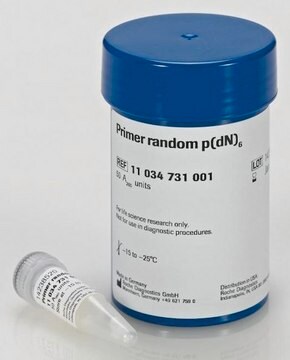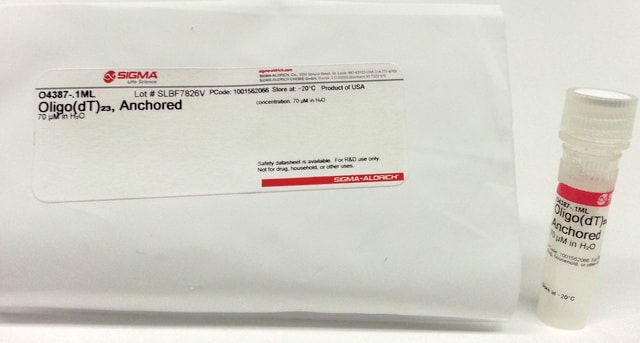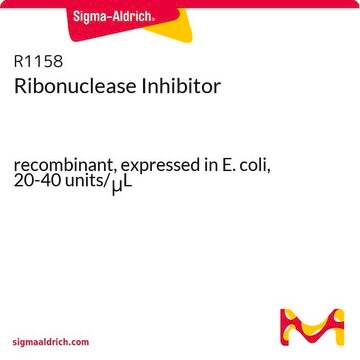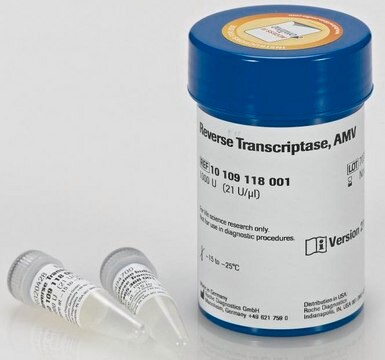R7647
Random Nonamers
for use as primers in cDNA synthesis, 50 μM in H2O
Synonym(s):
Oligodeoxynucleotides
About This Item
Recommended Products
grade
for molecular biology
Quality Level
form
liquid
usage
0.1 mL sufficient for 100 RT-PCR reactions
concentration
50 μM in H2O
shipped in
wet ice
storage temp.
−20°C
General description
Application
- First-strand cDNA synthesis
- Preparing cDNA libraries (with oligo (dT) primers
- Prepare labeled DNA probes for hybridizations
Features and Benefits
- When preparing cDNA libraries or dealing with situations where specific primers are not suitable, the random nonamers can be combined with anchored oligo (dT)23 primers (Product No. O4387).
- In cases of incomplete or missing sequence information, or when specific primers are not effective, the random nonamers offer a solution for cDNA library preparation.
- The random nonamers′ priming capability at higher temperatures (up to 65°C) is reduced, ensuring that they do not interfere with polymerase chain reaction(PCR) following transcription.
- Randomnonamers can also be used to prepare labeled DNA probes for hybridizationstudiesRandom nonamers serve as alternatives to specific reverse transcription (RT) primers for first-strand synthesis, cDNA library construction, and other applications.
Components
Other Notes
related product
Storage Class Code
12 - Non Combustible Liquids
WGK
WGK 1
Flash Point(F)
Not applicable
Flash Point(C)
Not applicable
Personal Protective Equipment
Regulatory Listings
Regulatory Listings are mainly provided for chemical products. Only limited information can be provided here for non-chemical products. No entry means none of the components are listed. It is the user’s obligation to ensure the safe and legal use of the product.
JAN Code
R7647-100UL-KC:
R7647-VAR:
R7647-25UG:
R7647-10UL:
R7647-BULK:
R7647-100UL:
R7647PROC:
Certificates of Analysis (COA)
Search for Certificates of Analysis (COA) by entering the products Lot/Batch Number. Lot and Batch Numbers can be found on a product’s label following the words ‘Lot’ or ‘Batch’.
Already Own This Product?
Find documentation for the products that you have recently purchased in the Document Library.
Customers Also Viewed
Our team of scientists has experience in all areas of research including Life Science, Material Science, Chemical Synthesis, Chromatography, Analytical and many others.
Contact Technical Service












![Enhanced Avian Reverse Transcriptase [eAMV™ RT] For reverse transcription at higher temperatures & rare mRNAs](/deepweb/assets/sigmaaldrich/product/images/496/245/af9bcef6-1474-494b-8fba-32ca0fd56c42/640/af9bcef6-1474-494b-8fba-32ca0fd56c42.jpg)

